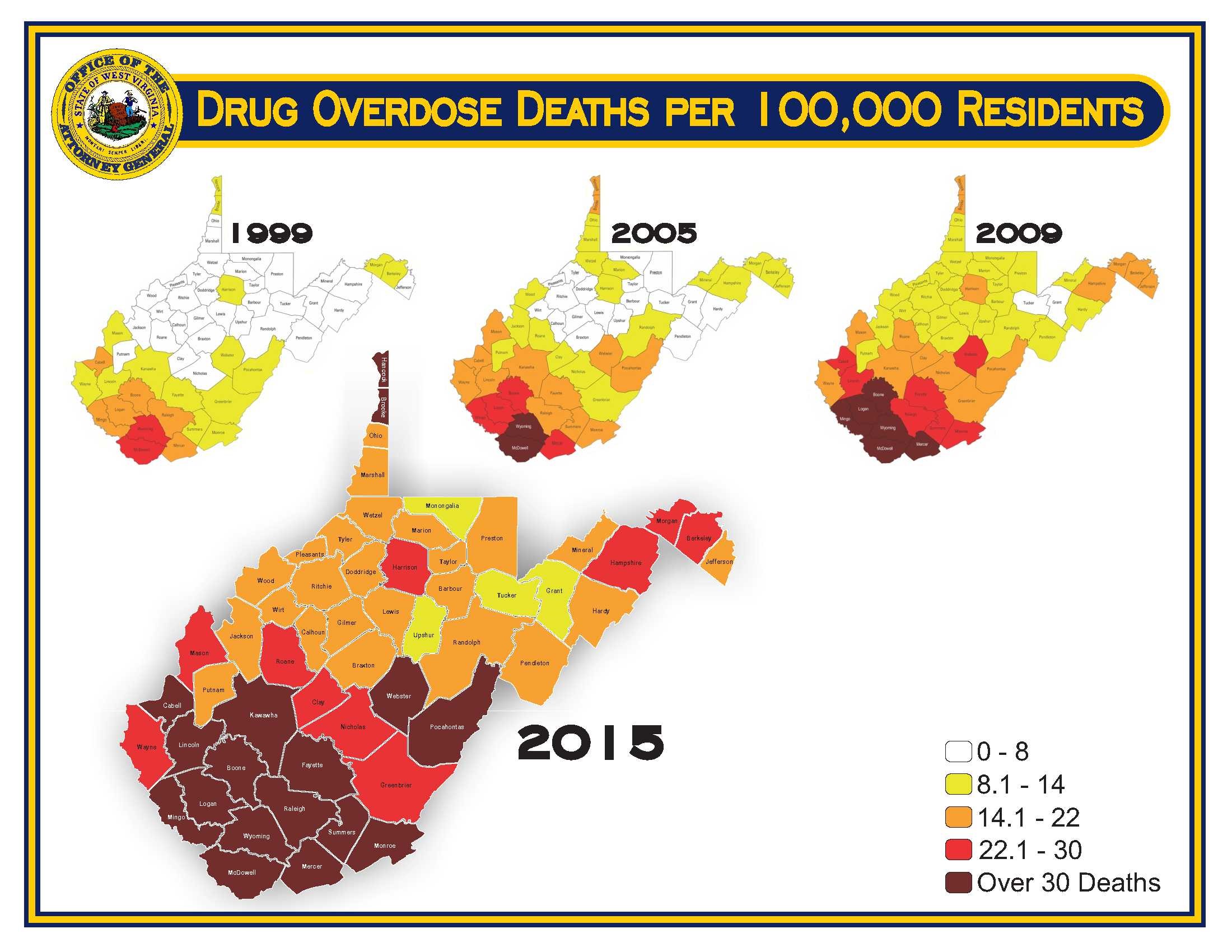A Faithful Conversation
about the
Substance Use Disorder
Crisis
WHAT IF, DURING THE EASTER SEASON
While the What If? program was designed to be used during the Lenten Season, local churches are invited to utilize these resources any time of the year.
We believe that God is calling each of us, and each church into the first steps of a ministry responding to the opioid epidemic.
For some ideas about how to use the What If? materials:
Some churches used the bulletin inserts and videos for Bible studies, some have used the Bulletin inserts for the bases of a sermon series, some have used the videos during worship, some have used the materials for individual spiritual growth. No matter how the material is used, I believe that seeds have been planted and new ministries are about to be born.
So what are the next steps?
- If you have received a clear vision of what to do…do it, what are you waiting for?!
- If you feel led to respond but not 100% sure what to do, visit organizations that are responding already in your community.Visit your local elementary school, meet your Drug Court Personnel, visit your local Family Resource Network there are dozens of groups that are responding…it is time to make connections and get involved. Remember how the disciples where holed up in their apartment after Jesus had ascended into heaven, and then the Holy Spirit came into their midst and empowered them to go out into the streets and proclaim the Gospel at Pentecost? We have been holed up in our sanctuaries for way too long, let the spirit move you!
- Remember all ministries start small, what is a first step you can take, what is a first step your church can take?
- If you want some more motivation, email me and I will come and present a program at your church or with a group of churches. My email is steinerball@gmail.com
- If you did not use the What If?... program during Lent, use it now! Just ignore the Lenten language and use it now. People are dying, people are lost, people are hurting…we have got to respond with the good news of the empty tomb. (Bulletin inserts and video interviews are below)
- If you have started a ministry…no matter how small, let us know about it. We want to collect the stories of how we are responding and tell others about the faithful witness in West Virginia. As we collect the stories our hope is to put them on our webpage so others who are considering their response can gain creative ideas from what is already happening. We are in this together and there is no need to re-invent the wheel.
What if we allowed God to use us in ways we had never considered before?
What if during the Easter Season?
Download the What If? Bulletin insert to introduce the series to your congregation.
To read the United Methodist News article about What If? and the West Virginia Conference response to the Opioid Crisis. Follow this link.
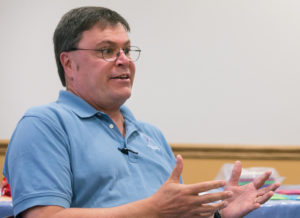
Photo by Mike DuBose, UMNS.
Rev. Dr. Barry Steiner Ball is available to visit to your church or organization.
What IF? Bulletin Inserts have been prepared to use during the season of Lent as a guide for prayerful consideration of how your faith community will address the opioid crisis.
7 weeks of inserts and videos are provided beginning with February 11 (the Sunday before Ash Wednesday) and going through Palm Sunday.
Rev. Dr. Barry Steiner Ball has provided both an Educational and Devotional piece for each week in Lent, as well as a video to use in small group studies or for individual reflection. The bulletin inserts are laid out two per page. The videos are on YouTube and will be added each week.
Week 1 An interview with Bishop Sandra Steiner Ball (below)
Week 2 An interview with a lay person in recovery.
Week 3 An interview with Melissa White who is raising her granddaughter
Week 4 An interview with Matt and Beth Johnson about foster adoption.
Week 5 An interview with Rev. Chip Bennett about "The Meeting Place" in Point Pleasant, WV.
Week 6 An interview with David Stilgenbauer and George Hohmann about volunteering in schools
Week 7 An interview with Wayne Worth about Neighbors Helping Neighbors, and how he goes door to door to help put a stop to the opioid crisis.
How is your church responding to the opioid crisis? Share your faith community's story by sending an email to: wvumc@wvumc.org
Copies of the Spiritual Formation booklet, Fast. Pray. Listen. Respond. have been mailed to each charge. 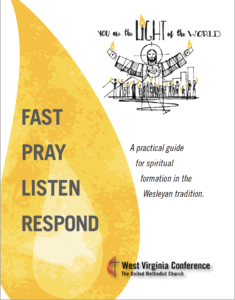
Additional copies of the Spiritual Formation booklet are available from your District Superintendent.
You may also choose to download a pdf of the Spiritual Formation Booklet by following this link.
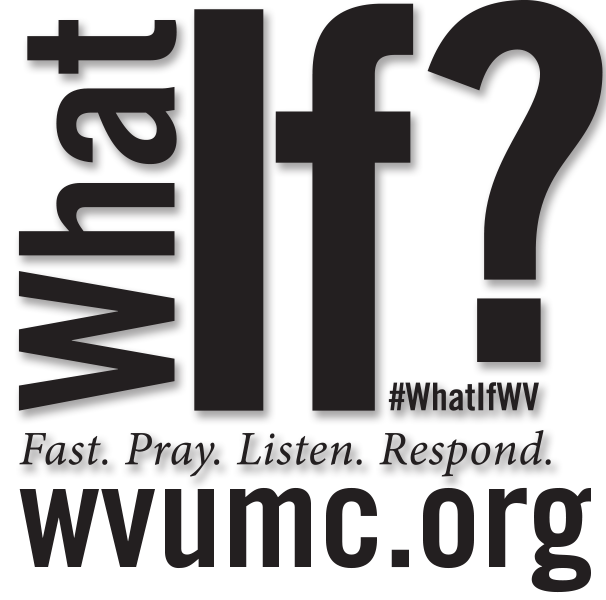
Week 7:
This week’s interview is with Wayne Worth, 2017 Denman Award winner and a lay person from Clarksburg. Wayne and some friends founded Neighbors helping Neighbors, a community action group that goes door to door to share important information about recovery.
Click here to download the discussion questions prepared by Barry Steiner Ball to use with the Week 7 video.
Click here to visit the Neighbors helping Neighbors Facebook page.
Contact Wayne Worth via Facebook private message for a customized handout for your community!
Week 6:
This week’s interview is with Rev. David Stilgenbauer, a pastor from Ronceverte and George Hohmann, a lay person from Charleston. They share about their experiences volunteering with children in the public schools.
Click here to download the discussion questions prepared by Barry Steiner Ball to use with the Week 6 video.
Week 5:
This week’s interview is with Rev. Chip Bennett, a pastor from Point Pleasant. Chip shares the story of The Meeting House, an ecumenical ministry that provides connection points for people who are in recovery in the Point Pleasant area.
Click here to download the discussion questions prepared by Barry Steiner Ball to use with the Week 5 video.
Week 4:
This week’s interview is with Beth and Matt Johnson, a young couple from Morgantown. Matt is the Associate pastor at Suncrest United Methodist Church and Beth is the campus pastor at WVU. In 2017, after a two-year process, the Johnsons adopted siblings via foster care. Today they share their story of becoming foster parents and adoption.
Click here to download the discussion questions prepared by Barry Steiner Ball to use with the Week 4 video.
Week 3:
This week’s What If? interview is with Rev. Melissa White. Melissa is a West Virginia conference pastor whose daughter is 15 months into a 10-year prison term. Melissa and her husband adopted their 6-year-old granddaughter when she was about two because of their daughter’s struggles with substance use disorder. Melissa shares her experiences as a parent, a pastor and now an adoptive parent.
Click here to download the discussion questions prepared by Barry Steiner Ball to use with the Week 3 video.
Week 2: This week's interview is with a wonderfully strong and honest young woman named Ann Hammond from Clarksburg, WV. Ann is recovering from substance abuse disorder and has an amazing story to tell. She is currently working for HELP 4 WV the 24-hour helpline that works to get substance abuse disorder sufferers into rehabilitation. Ann grew up in United Methodist Temple in Clarksburg and is now back in the church healthy and very active.
Click here to download the discussion questions prepared by Barry Steiner Ball to use with the Week 2 video.
Week 1: As you view the video this week for the “What If” Lenten focus, you will discover that as a teenager, I enabled behavior that was not healthy for my brother. Later in his life, the multiplication of continued unhealthy choices led to substance use disorder particularly in relation to use of alcohol.
I often wonder… What if I had been more concerned with influencing my brother’s choices toward a more healthy direction rather than being concerned with “keeping him out of trouble?” What if conversations about substance use disorder, alcoholism, and addiction had taken place with more frequency in my communities or church as I was growing up? Would that have made a difference for me and my brother growing up?
What if conversations about substance use disorder, alcoholism, and addiction would take place with more frequency in our communities and churches so that youth, teens, and adults were more educated and more focused on interrupting the cycle of addiction? What if we enabled the sharing of stories in terms of how addiction has affected families as well as share the stories of transformation in regard to addiction so that people know they are not alone and that there is hope? What if …
Bishop Sandra Steiner Ball
Click here to download the above statement and questions for small group discussion.
West Virginia Day of Hope: Miracles Happen
![]()
The Day of Hope: A Celebration of Prevention and Recovery is a day when we can lift up resources, offer a timeofconsolation, and share stories of recovery. Please plan to lift up prayers, have conversations, and develop action plans around how your faith community can become a part of helping our people and our communities become a resource and support for recovery. 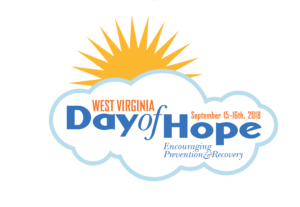
This past year, I have helped co-chair a committee of the West Virginia Council of Churches which facilitated a series of listening events on substance use disorder across the state of West Virginia. Let me share a little of what was discovered. “The listening events were intense, often personal, and a calling for faith communities to become places of healing, both within and outside our walls. To make that happen, faith communities need to have accurate information, opportunities for sharing helpful and accurate information, and a sense of the hope that we can offer to families and persons in the midst of their suffering.” * On May 25, over 300 clergy persons from a wide variety of denominations gathered for a day on the campus of West Virginia Wesleyan to learn, share, and to begin to make plans for how we, as faith communities can work together to stem the tide of addiction and to find ways to help those affected by addiction.
As United Methodist’s,
L) Alcohol and Other Drugs- We affirm our long-standing support of abstinence from alcohol as a faithful witness to God’s liberating and redeeming love for persons. We support abstinence from the use of any illegal drugs. Since the use of illegal drugs, as well as illegal and problematic use of alcohol, is a major factor in crime, disease, death, and family dysfunction, we support educational programs as well as other prevention strategies encouraging abstinence from illegal drug use and, with regard to those who choose to consume alcoholic beverages, judicious use with deliberate and intentional restraint, with Scripture as a guide. … We commit ourselves to assisting those who suffer from abuse or dependence, and their families, in finding freedom through Jesus Christ and in finding good opportunities for treatment, for ongoing counseling, and for reintegration into society. (Paragraph 162 (L) The Book of Discipline 2016, page 124-125)
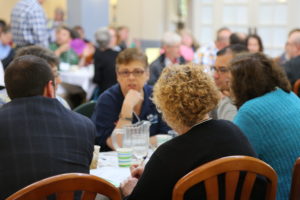
My on-going hope is that this Day of Hope will begin and/or continue some solution-oriented discussions in every congregation that will create a climate of support for families and individuals. My hope is that these discussions will lead to actions that seek to support those who are in recovery and sustained abstinence from substances of abuse. My hope is that in raising our levels of awareness and education that we will see that we can do something to support our youth and assist them in active ways to live drug-free lives.
I join other leaders of faith within the West Virginia Council of Churches and beyond, in the hope and prayer that this day, annually observed, will make a difference throughout the Mountain State. Faith communities can add prayers, sermons or other ideas to their services, but our hope is this day will be a yearly reminder and encouragement to continue to work to lower substance use disorder in West Virginia throughout the year...beyond the Day of Hope.
As a people of faith, we are to offer compassion for those suffering, ministries of healing for those who are sick, and hospitality within our sanctuaries for those seeking comfort and hope. The Substance Abuse Prevention agencies across the state of West Virginia stand ready to assist you and your faith community with resources, information and workshops to assist all of us in creating a true day of hope.
I hope you will invite some serious discussion in your church and community about actions that can be taken as we share in this Day of Hope.
Peace,
Bishop Sandra Steiner Ball
